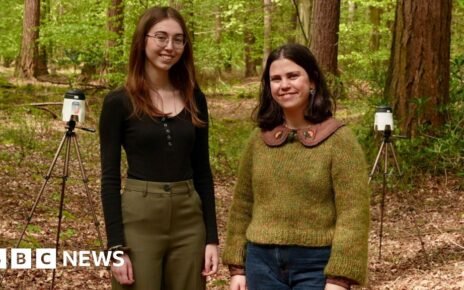By Claire Quinn, BBC News NI
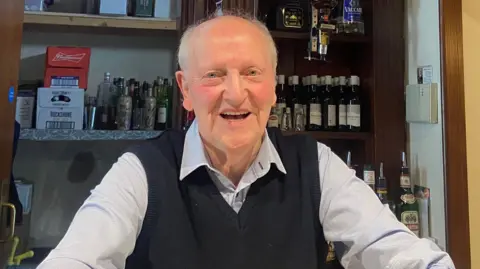 BBC
BBCWalking through the Diamond in the centre of Clones you can imagine the days when market traders would have set stalls up and locals would line the one-way streets.
Nowadays a visitor to the town sees a confectioner, a pharmacy, stone steps up to a church, and a lot of pubs.
There are market towns like this all over Ireland.
But Clones has something special – every year this County Monaghan border town hosts one of the biggest events in Ireland’s sporting calendar.
The Ulster Gaelic football final brings 29,000 hyped-up GAA fans to a town with a population of less than 2,000.
Huge crowds descend on St Tiernach’s Park, just a five-minute walk from the Diamond. Pubs overflow, restaurants and chippy vans do non-stop trade and entrepreneurial types lucky enough to own land on the town’s outskirts turn their fields and driveways into temporary car parks.
For Ulster GAA fans, Clones residents and businesses alike, it’s a massive day out and one the town has hosted almost every year since 1905.
But, in a few more years, it could all be over.
Almost 80 miles away in west Belfast is Casement Park where, if ambitious plans for a new 34-000 capacity stadium finally come off, the Ulster Final will be relocated.
It is earmarked as Northern Ireland’s sole venue to host Euro 2028 but faces a redevelopment cost estimated to be over £300m, leaving question marks over whether it will be built on time.
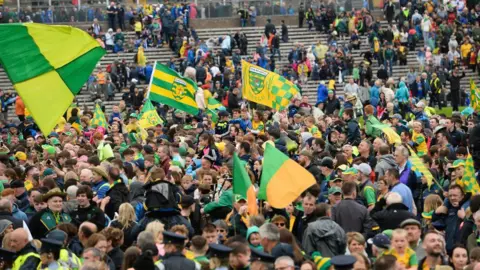 Getty
Getty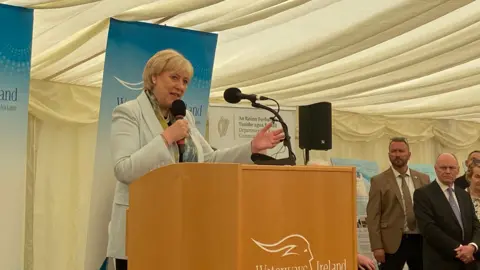
Heather Humphreys, an Irish government minister and Clones resident, joked that “there weren’t many tears shed here” when news broke of Casement’s latest delay.
Speaking at an event to open the second completion phase of the Ulster Canal restoration, she proclaimed Clones as the “official home of the Ulster GAA final”.
Taoiseach (Irish prime minister) Simon Harris took to the microphone after her and, through a nervous laugh, said that the government, which has pledged €50m (£43m) to the project, “remains committed to the development of Casement Park”.
Later, Ms Humphreys said she thought there was “room in both places for many more events”.
But what is the mood like in the town itself over the potential loss of the GAA Ulster final?
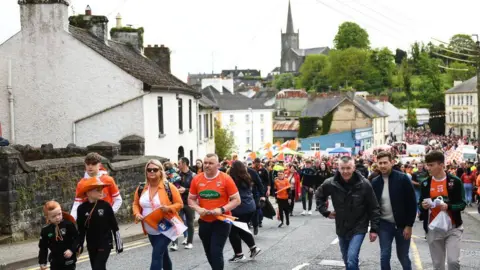 Getty
GettyPat Walsh, who runs the Cúil Darach Bar, Restaurant and B&B in the town centre, said it would ruin Clones if it no longer hosted the Ulster final.
“There’s nothing like it here in the town when there are big matches on,” Mr Walsh said.
“People stay in the hotels, eat and drink in the pubs and restaurants, and spend money in the shops. Businesses here need those big days to stay. It would be a huge loss.”
One of Mr Walsh’s customers, local resident Jimmy McCaffrey, chimed in when he heard the words Casement Park: “Don’t build it!”
“You can’t beat it when there is a big match day on here, it’s like being in Dublin,” he added.
‘A big day for us’
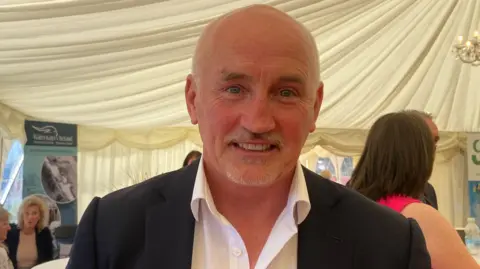
There are aspects to Clones that some fans won’t miss.
Many would argue the tiny town is an inappropriate venue for such a big event. The event causes gridlock in and out of the small rural roads surrounding Clones. The hours-long traffic queue to leave after an Ulster final is infamous, exacerbated by the mostly ad-hoc parking facilities in various fields on the town’s outskirts.
However, others would say there would also be a question marks around traffic infrastructure and parking facilities for Casement.
For Clones’ most famous son, former world boxing champion Barry McGuigan, Casement should go ahead – but the people of his town still want big games to be hosted there as much as possible.
“I remember as a child 40,000, 50,000 people coming into the town, it was a big day for us,” he continued.
McGuigan’s family ran a grocery shop in the town when he was growing up.
“We would have the shop open from the early hours, prepping for it and having stalls out the front, it was a huge day from a business perspective and footfall.
“So we would like as many big games in Clones as possible.”
What is the history of Clones?
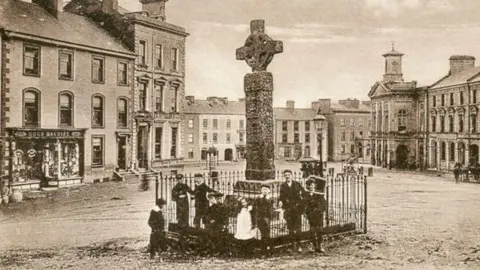 Ulster Canal Stores
Ulster Canal StoresClones was once a thriving market town and situated on the Great Northern Railway’s major junctions in the 1800s, making it an important town for transport.
It was once an ecclesiastical site where a monastery once stood with circular monastic cells, churches and a round tower.
The world famous Clones Lace was created during the Famine Relief Scheme, introduced by philanthropist Cassandra Hand, and made its way to fashion houses throughout Europe as a master craft of lace making.
Anne Corley, a local historian and the curator of the Cassandra Hand Heritage, Tourism and Genealogy Centre, tells the BBC that Clones should be given historical heritage status due to its many historical sites.
Clones was once a prosperous town but suffered when the border was created nearby.
During the partition of Ireland, Monaghan, along with Cavan and Donegal, remained part of Ulster but became counties in the new Irish Free State.
The authors of a 2005 study titled The Emerald Curtain: The Social Impact of the Irish Border wrote that Clones declined in the early 20th century due to “loss of hinterland, waves of economic decline, disinvestment by the state, violence and tension arising from the militarisation of the surrounding area, the fractured social connections arising from the road closures, and a Protestant exodus”.
‘It would be a huge blow’
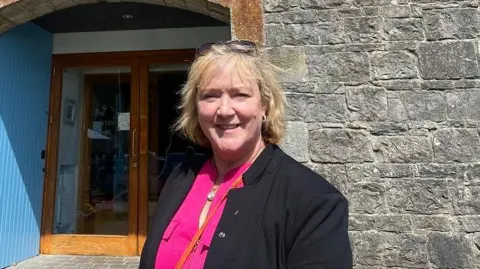
Speaking to those whose passion it is to keep the history of the town alive, it is clear that while Clones has a vast history, a final day at St. Tiernach’s Park is still the biggest day.
“While I’m not the biggest football fan, I know the value that the big games have to the town here,” local historian Anne Corley said.
“I think it would destroy the town if the big games weren’t hosted here. It’s not just the pubs and hotels, the local youth groups have stalls during the big games selling burgers and refreshments.
“Here in Clones we have so much to offer and with the Ulster Canal getting redeveloped, if we lost something big like this now it would be a huge blow,” Ms Corley said.
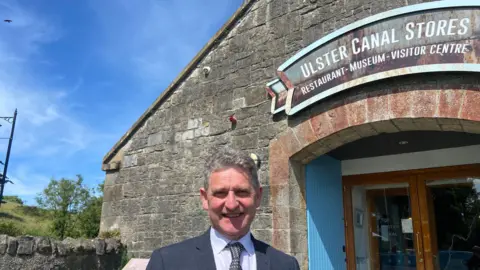
Hugh Tunney is the manager of the Ulster Canal Stores visitor centre. He said the Ulster final is the one big day of the year for the town.
“Businesses would rely on the final for the whole year, it would be a big blow to the economy here if we were to lose it,” Mr Tunney said.
The Ulster Canal Stores is a community enterprise in conjunction with Clones Development Society and offers a meals on wheels service to over 65s.
“The matches mean a lot to the people here of Clones, but if we didn’t host the big games anymore businesses would suffer, community initiatives like ours would suffer.”




